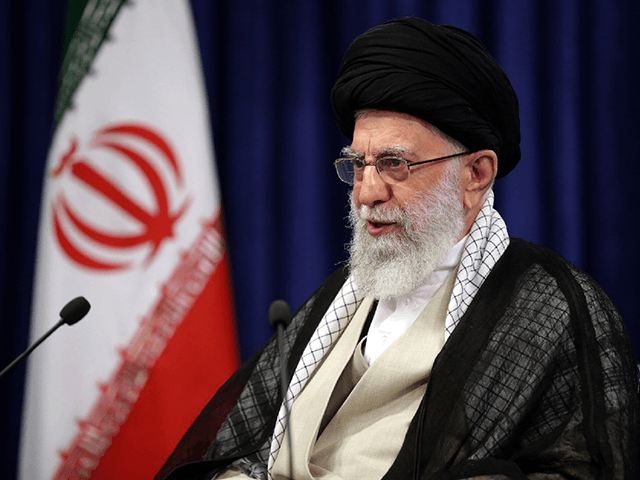Kuwait and the United Arab Emirates (UAE) took steps this week to restore diplomatic relations with Iran, a tacit acknowledgment that President Joe Biden’s reckless determination to restore the Iran nuclear deal will make Tehran vastly more rich and powerful, not to mention bringing it closer to deploying a nuclear umbrella.
The latest word on the Biden nuclear deal has Iran allegedly reaping an incredible $90 billion windfall from sanctions relief and unfrozen currency reserves, even before Tehran begins piling up cash from renewed oil sales. The Biden deal, if as reported, is even more lucrative for the world’s leading state sponsors of terrorism than former President Barack Obama’s very generous Joint Comprehensive Plan of Action (JCPOA), which was suspended by President Donald Trump in May 2018 after years of Iranian misbehavior.
Kuwait and the UAE can see the coming “realignment” in the Middle East. The Emiratis are especially clear on what Iran will do with its Biden billions, having been attacked repeatedly by the Iran-backed Houthi insurgency in Yemen. The next shipment of Iranian weapons to the Houthis, whose motto is “Allah is Great, Death to America, Death to Israel, Curse the Jews, Victory to Islam,” is likely to include some expensive premium merchandise.
Kuwait on Sunday announced the dispatch of its first ambassador to Iran in over six years. The last ambassador was recalled in 2016 during a regional crisis that began with the Saudi execution of an Iran-supported Shiite cleric and regime change enthusiast named Nimr al-Nimr.
The Saudis severed diplomatic relations with Iran after their embassy in Tehran was attacked by a mob, and the Kuwaitis soon followed suit. As with Saudi Arabia, Kuwait is ruled by a Sunni Muslim monarchy but has a sizable Shiite minority. Iran, the dominant force in Shia Islam, works to keep Shiite minorities in Sunni countries restless.
Kuwait’s Shiites were angered in May by a raid on the largest Shiite mosque in the country during which its influential imam, Sheikh Mahdi al-Hazeem, was roughed up by government security forces. In July, some Kuwaiti lawmakers called for the deportation of an Iranian religious scholar named Ahmed al-Sherazi for making derogatory remarks about Sunni Islam.
The UAE also downgraded its diplomatic relations with Iran in 2016 and is now ramping them up again. On Sunday, the Emiratis announced that Ambassador Saif Mohammed al-Zaabi will “resume his duties at the UAE embassy in the Islamic republic of Iran in the coming days” after a six-year absence.
Until recently, the UAE urged “collective diplomacy” in which all of the Gulf Arab states would deal with Iran as a bloc. The Emiratis were willing to provoke Iran’s rage in 2020 by establishing relations with Israel under President Donald Trump’s Abraham Accords, an overture followed up with a historic UAE-Israel free trade agreement in May 2022.
Today, the UAE and other Gulf states are acting individually to make their peace with Tehran. The Senate Republican Policy Committee (RPC) argued in early August that Biden squandered the goodwill of the Abraham Accords and the opportunity presented by a “Middle East united against the Iranian threat,” while his disastrous withdrawal from Afghanistan frightened our regional allies into believing the U.S. is not worth much as a strategic partner.
The RPC said it was no surprise that America’s traditional Middle Eastern allies are cozying up to malevolent powers like Iran, Russia, and China:
As a result, countries in the area have shown they are willing to not side with the United States in a conflict. The UAE and Saudi Arabia abstained from an April vote to remove Russia from the U.N. Human Rights Council over its invasion of Ukraine. Israel, Libya, and Turkey supported the resolution, while our other allies in the region like Jordan and Egypt also chose to abstain. China voted against the resolution. The UAE and Saudi Arabia reportedly ignored President Biden’s attempts to coax them into producing more oil in the spring. Then the Saudis hosted Russian Foreign Minister Sergey Lavrov in June, giving Vladimir Putin’s regime international legitimacy after the West had sought to isolate it through sanctions
China is ready to step in with military and political support if America’s traditional allies like Saudi Arabia and the UAE lose faith in U.S. leadership. The Chinese have been selling armed drones in the region for years, partly because of a reluctance by the U.S. to sell drones to our Gulf allies during the Obama administration. Earlier this year, the UAE said it planned to purchase 12 trainer jets from China with an option for dozens more.
China is also said to be working with the Saudis to develop ballistic missile technology. According to Defense News, a Chinese firm signed a deal in March to build a military drone factory in Saudi Arabia through a joint venture with a Saudi company. These developments are an expansion of Chinese military support in Saudi Arabia. For their part, the Russians recently signed a defense cooperative agreement with the Saudis, vowing to build their military relationship with a traditional U.S. ally.
The RPC urged Biden to pull out of Iran nuclear deal negotiations and “pursue a new plan that enforces sanctions on Iranian oil sales, seeks stronger censures at the International Atomic Energy Agency, and triggers snapback sanctions at the U.N.”
Israel offered the same advice on Wednesday. Prime Minister Yair Lapid dismissed the slowly congealing nuclear sellout as a “bad deal” that does not even meet President Biden’s own standards for “preventing Iran from becoming a nuclear state.”
Lapid warned Iran’s windfall from the Biden deal would “fund the Revolutionary Guard,” which is a designated terrorist organization.
“It will fund more attacks on American bases in the Middle East. It will be used to strengthen Hezbollah, Hamas, and Islamic Jihad,” he warned.

COMMENTS
Please let us know if you're having issues with commenting.